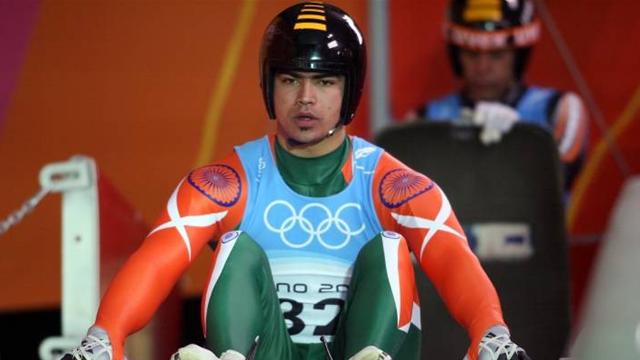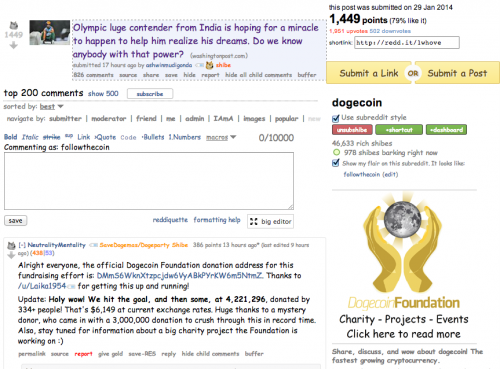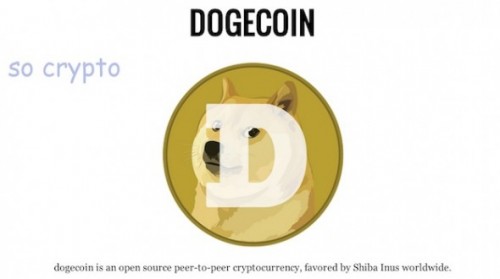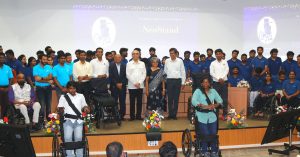How The Dogecoin Community Sent Indian Luge Contender Shiva Keshavan to the Olympics
Read how the incredible dogecoin community raised funds to send Indian luge contender Shiva Keshavan to the Olympics when his own government deserted him and get an introduction into the mysterious world of cryptocurrencies!

Shiva Keshavan participated and was the only Indian hope at the winter Olympics 2014 held in Sochi last week. He did not bag any medals, but given the hardships he went through, his qualification itself was nothing short of a miracle! He represented a nation that was suspended from the Olympics, in a sport that had no backing or recognition in his home country. How many people in India had even heard of luge before Keshavan came into the picture? In lieu of his never-say-die attitude, when Shiva was left to fend for himself by the Indian authorities, a motley group of donors from all over the world came together to help him realise his dream. Here, Ashwin Mudigonda, entertainingly recounts the interesting chain of events that took place to make this happen and also introduces you to the mysterious world of crypto-currencies!
There is a scene in the Lord of the Rings when all hope for the protagonists appear to be lost in the mighty battle against Saruman at Helm’s Deep. And then, in the distance, a silhouette appears on a white horse and with a battle cry, swoops down upon the valley with an army of warriors, and thwarts the orc attack.
Dogecoin is as intangible as Gandalf, but its power far exceeds that of the grand wizard.
News appeared in the Washington Post (online) that Keshavan Shiva, a determined Olympic luge contender from Himachal Pradesh, was denied funds and training by the Indian government, and left to fend for himself for the Sochi Olympics. It wrenched many hearts. But when it was learned that he would not be allowed wave the tricolor because of India’s suspension from the International Olympic Committee, and that the Indian national anthem would not be played, it was rubbing salt in the wound.
Like pacing tigers in a cage, eager folks all over the world were itching to help, but had no idea where to start. Where was Keshavan? Did he have enough money to make it to Sochi? How could he be contacted? How much money does he need? Could a Kickstarter campaign be launched for him?
So many questions; so few answers.
An interesting event happened in the lead up to the Sochi Olympics. The Jamaican bobsled team needed about 35,000 USD to compete at Sochi, and they, too, were abandoned by their own government. The enthusiastic supporters of a nascent virtual currency called dogecoin rallied to their cause and raised the required money in a short time. Until that time, dogecoin was treated as a joke, but now it had shown that it could make a difference in people’s lives.
It was only natural for someone to post the same request on behalf of Keshav. The title of the appeal on Reddit read – “Olympic luge contender from India is hoping for a miracle to happen to help him realize his dreams. Do we know anybody with that power?” It was a typical post in the dogecoin subreddit community – sincere and cheeky at the same time. The first few comments poured in:
“I feel like this needs to happen. Another underdoge who is looking for a miracle. I’ll donate 5000 doge if the foundation gets behind this.” – infernalaanger wrote.
The pledges began to trickle in, and the pressure began to build. A veteran of efforts like this, a user named NeutralityMentality, set up a recipient address at the Dogecoin Foundation, a non-profit charity organization, and asked the users to point their donations to it. In minutes, the coins started gushing in. People were ecstatic. They wanted to give more, and in the spirit of the community, many of them who commented on the thread saying that they just donated were themselves given tips (in dogecoins) by others.
The inside joke amongst the shibes (as dogecoin enthusiasts are known) was that their currency, just like Bitcoin, the granddaddy of all cryptocurrencies, would also become extremely valuable, and so, “To the moon!” became a victory cry each time the value of the currency went up. Soon, the comments reflected that:
“50K to the moon,” CitizenOlympic wrote.
“Sent all of my 150 doge! Thank you for showing us this! First Jamaica, now India! To the Moonlympics!” wrote weareexogenesis.
As the money poured in, the commentators began to get giddy with excitement. Many thought that in about 24 hours the goal would be reached. But they were in for a pleasant surprise.
“Someone sent in 3M, 30% of his/her wallet!” siaubas wrote.
Three million dogecoins (~4,500 USD) were sent by a mystery donor.
“Holy wow! We hit the goal, and then some, at 4,221,296 (dogecoins) donated by 334+ people! That’s $6149 at current exchange rates,” wrote NeutralityMentality.
And just like a high-octane luge lap, the fundraising was over!
There were some skeptics along the way, questioning why Shiva needed money when news reports said that he was endorsing brands and had raised sufficient funds. Sudeep1360, a resident of Delhi, and a close friend of Shiva and his wife, Namita, explained by publishing a response from Namita:
Shiva is sponsored by the Olympic Gold Quest, and endorses a few brands in India. He has been managing to train and compete with all the money he raises personally. In simple words, he mainly represents the country at his own expense. FYI, the total required budget for a Season is approximately INR 50 Lakhs, which Shiva has raised personally all these years. There are no facilities or infrastructure in India, which forces him to train abroad, something like the Jamaican team. It was 2 months prior to the 2010 Olympic Games and now for the 2014 Games that the Govt. offered support, nothing in the middle. Also, please note that they were part sanctions, which means they only gave him 5-10% of the total amount actually required by him. I write all this for your information, so that it is clear who and why you all are supporting the Indian athletes.
There was a lot of soul-searching and back-thumping amongst the community. Some Indians hung their head in shame while still feeling grateful.
“As an Indian I feel ashamed right now,” wrote tazz_2004.
“This is Brilliant! You guys are AWESOME! I, being an Indian myself, am ashamed and aware of the corruption here. This is rubbish, but what you guys have done, and shown the world is AMAZING!” Digipedia gushed, before adding, “I love you guys!”
Elsewhere on the India sub-reddit people went online in the evening to find that there was a call for action, and the call answered. They read and re-read the thread, and realized what a roller-coaster ride it had been.
“Dude, I was always skeptic of crypto currencies so I am late to the party and I only have 8 dogecoins and 0 bitcoin. But I do this kind of contribution via card or transfer. What about a Kickstarter or IndieGoGo campaign? Somebody responsible and experienced can handle this (unfortunately I’m neither),” wrote amar_.
But NeutralityMentality, who had been patrolling the threads and encouraging people and passing on relevant information, replied:
“We already hit the target, raised over $6000 🙂 But here, you go,” and tipped amar_ 800 dogecoins.
For the casual observer, this entire charade might appear too frenetic, almost maniacal, and something that happens inside a Scientology type cult. But it isn’t. The last decade was ruled by the internet. The future, from here on, will be owned by decentralized cryptocurrencies. What started as a mysterious and incomprehensible concept – bitcoin – slowly evolved into a juggernaut today. And since the concept was open-sourced, others were free to copy it.

This is how cryptocurrencies work. Let us assume that there are ten glasses of bubble-tea – that delicious Taiwanese milk tea with balls of tapioca balls. The goal is to drink the tea (not suck up and eat the balls). The rule is that only after the first glass is emptied can the next one be approached. And also, the size of the balls increases and the quantity of tea reduces with every glass.
Now in this quite funny setup, any person (and this is the strength of the system; unlike a bank, you don’t need to verify yourself to “open an account”) with a straw is deemed a miner. He puts the straw in the first glass and slurps. Because the balls are small, if he gets one in his straw, he can blow it away and resume drinking the tea. Someone else can join him with his own straw and share the tea. This continues until all the tea is drunk. Then all the “miners” proceed to the next glass. However now, the effort involved in drinking the tea will be more because the tapioca balls are larger and a lot more effort will be spent discarding the balls, and searching for the tea.
As this game progresses, more people realize that there is free tea to be had, and rush with their straws. The tea gets drunk quicker and quicker, and people move on to the next glass where it becomes even more difficult to drink.
And that in a nutshell is how all the cryptocurrencies are “mined”
Initially, there are 0 coins. Anyone with an internet connection can mine these coins. Mining requires one to possess decent computing power to perform calculations. When the calculations are successful, the coins are rewarded to the person. When the mining for any currency initially begins, the complexity of the problems are designed to be very simple, and they payouts very high. So, pioneers in search of the gold vein can easily mine hundreds or even thousands of coins using a PC with a decent CPU (like i5/i7).
As the number of coins cross certain predetermined thresholds, the complexity increase, and the payouts decrease. Now, only users with powerful GPUs may reap the rewards. However, it’s still possible to mine “solo” at this stage.
Eventually, and this is the case with bitcoin today, the complexity reaches insane amounts, and the payouts also decrease. It then makes no sense to mine solo. Not only does the chance of finding coins reduce, but cost of the energy involved in running a PC 24/7 outweighs any coins mined. This is when users opt for one of two routes: the quicker way is to join a pool where many users’ computing power is combined, and the rewards are proportionately split depending on the contributions. Or, to purchase powerful mining rigs and go solo. These rigs are very expensive, but they are capable of solving blocks quickly.
Coins can be stored on a PC in something known as a wallet. Coins can also be sent to other wallets in a very simple fashion. One puts the recipient’s address (a very long set of numbers and letters) along with the number of coins, and hit send. The coins jump from PC to PC (hence the word decentralized) and after about 6 jumps, it reaches the sender. It can take anywhere from a few minutes to a couple of hours for transactions to happen.
The true power of bitcoin will be realized when a teenager in a remote village in A.P. installs a digital wallet on his first smartphone, and someone from the International Space Station sends him bitcoins! All this with no government intervention, and no fees to banks.
What the bitcoin revolution showcased was that pioneers who mined and cached hundreds of bitcoins found themselves to be millionaires towards late 2013 when the cost of one coin hit 1000$ (it’s been steady at 800$ for the past few weeks). Bitcoins are now being rapidly adopted by merchants all over the world. Bitcoin ATMs are cropping up at airports. And rumors are that Amazon might be considering accepting bitcoins as a form of payment. It’s only a matter of time before Word stops putting a red squiggly line under the word bitcoin!
Dogecoin was borne out of a joke. While the maximum number of bitcoins there ever will be is 21 million, the maximum number of dogecoins was hardwired to be 100 billion! With that many coins, the difficulty stays low for longer, allowing solo miners to gain coins easily for longer. The goal was to create a currency like bitcoin, but only more accessible so that people could have fun with it. It started as a way to tip comments on reddit, but soon evolved to take on more real-world issues.
Just as how a good camera does not necessarily make a great photographer, a successful virtual currency is only as good as the people using them. The dogecoin enthusiasts are famous for their helpful and playful nature, encouraging the uninitiated to study the protocol, and tipping generously to instill a sense of camaraderie.
If only people adopted this attitude in the real world, it would be a nicer place to live. For now, the shibes are reveling in the fact that Shiva Keshavan got to go to Sochi.
In the video below, Shiva Keshavan speaks to the Athlete Profiles series about his journey in the Luge event from practicing on the highways of the Himalayas to competing in the Winter Olympic Games. (If you can’t watch it below, click here.)
Update:
When the stars align, many things happen! On reaching Sochi, Keshavan and Namita found that the Indian government had decided to fund the luge team in its entirety. Perhaps, it was due to the moral compunctions of some official or maybe because of the international attention during an election year. Whatever be the reason, the news is that the Indian luge athletes didn’t have to worry about the money.
Keshavan took the time to thank the dogecoin community with the following message:
We want to thank all of you for your generosity and support. I and two other athletes from India will be competing as Independents due to the suspension of the Indian Olympic Association for non-compliance with the Olympic Charter, in particular the Ethics Clause that requires office bearers charged with corruption to step down from office. As the National Olympic Committee stands suspended, the Ministry of Sports (Government of India) has agreed to bear the cost of travel of all Indian Athletes and support staff to Sochi. The Government has also paid for the equipment of the skiers. Although I am very grateful and humbled by your generosity, I cannot accept funds for costs that have already been paid. I would like to see the funds you raised be used for a good cause. After speaking with the Dogecoin Foundation, we have decided to support two causes important to us and currently promoted by the Foundation: children and animals, by having the funds raised for the travel costs go towards to the Doge 4 Kids campaign.
We are very busy during the Olympics, but afterwards we would be interested in sharing more with you about the charitable work we are doing in India with children and sports. We are honored to have your support for the Olympics, and thank you again.
And with that the chapter came to a close. And a new one opened. At Sochi.
This story made me
- 97
- 121
- 89
- 167
Tell Us More
We bring stories straight from the heart of India, to inspire millions and create a wave of impact. Our positive movement is growing bigger everyday, and we would love for you to join it.
Please contribute whatever you can, every little penny helps our team in bringing you more stories that support dreams and spread hope.



















